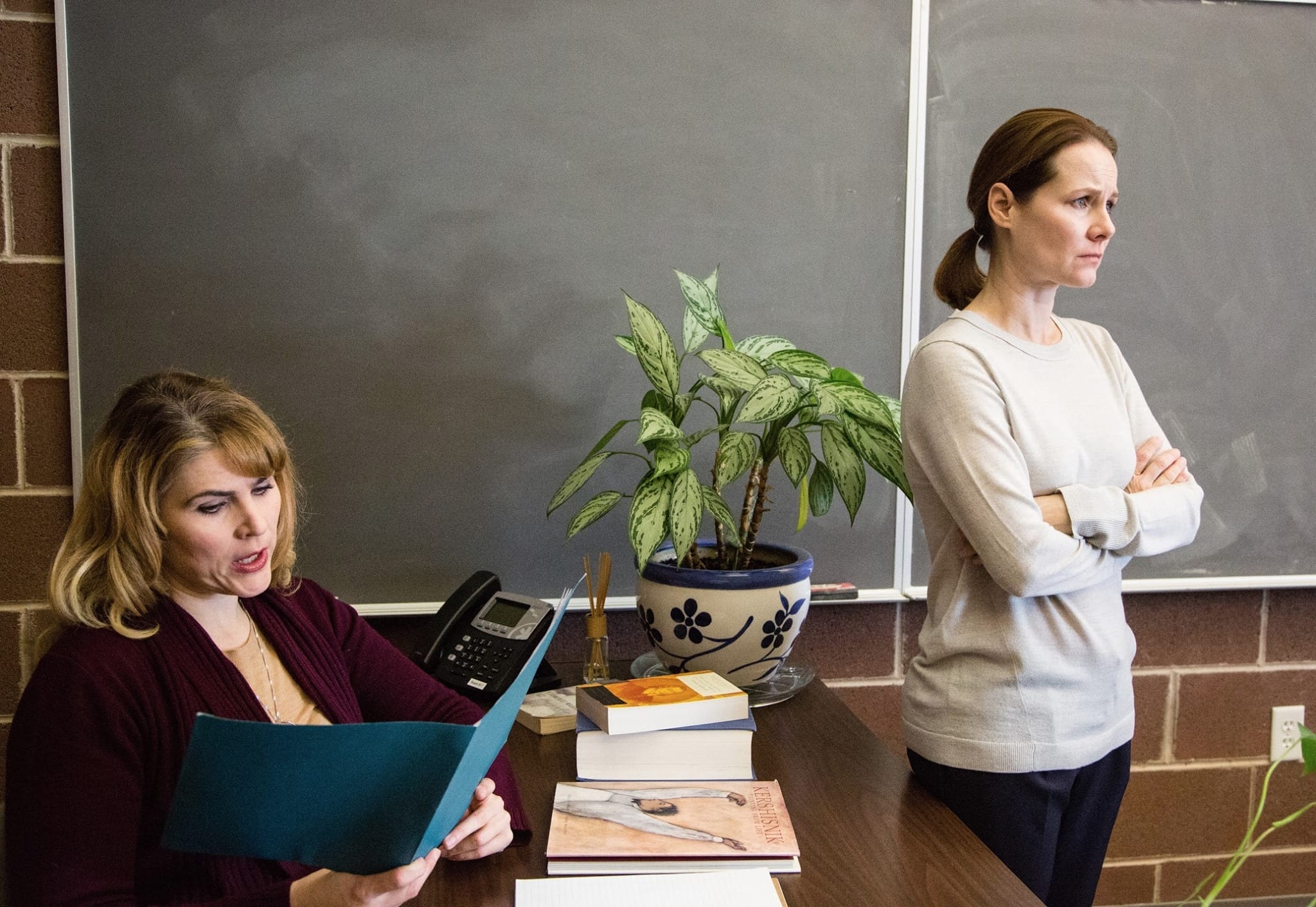SALT LAKE CITY — Gidion’s Knot by Johnna Adams is a script that I was previously unfamiliar with, and the synopsis found online hardly did the final performance justice. It is a complicated, nuanced play fraught with tense emotion and masterfully unveiling new levels of storytelling with every passing minute. I found myself absolutely unable to look away from the stage as the narrative unfolded.

Gidion’s Knot begins on premise of a parent-teacher conference, albeit an extremely unusual one. The audience learns that previous to the scheduled conference, Corryn’s son committed suicide. Rather than to dismiss the conference, she shows up at the school with intent to confront her son’s teacher, Heather, regarding the details of the suspension which led to Gidion’s death. Initially reticent to share details, it becomes all too-apparent that whatever transpired is enough to provoke standstill, with Heather refusing to share details until a third-party is present. Corryn is relentless, antagonistic at times in her pursuit to reveal the truth; the audience learns as slowly as she does, but the desire to know is all-consuming. Tension mounts as the two women prowl around the core of the discussion, and only when pushed to extremes are answers given. Gidion’s sexuality, his relationships with the other students, and artistic ability are called into question with revelation of a story he’s written, depicting his school as a cannibalistic, dystopian society. Corryn thinks it is art; Heather thinks it is dangerous. Both refuse to budge in their idealism.
The acting is the real powerhouse in this show. I don’t think I’ve seen a show with such relentless tension, but the powerful women on stage never fell into defeat or laziness. Each had an agenda from the moment the play started, and that purpose never left the stage. As Corryn, Tiffani DiGregorio becomes a viable threat. Her initial interaction certainly lends to a more indomitable air, but when pushed to defend her son, becomes absolutely bloodthirsty. She tears away at Heather like a lioness, provoking the other’s maternal and career shortcomings and never backing down. Corryn brings in new levels of manipulation are brought in, making her a complex foe to watch. Even more enjoyable, however, are moments of introspection that reflect on Corryn’s own shortcomings as a single mother. Had she been more tender, she wonders, would her son have still killed himself? It’s a complicated role, and DiGregorio acts the hell out of it.

Matched in this intensity is Stacy Jenson as Heather. Perhaps it is because I too teach middle school for my profession, but I found overwhelming empathy for the character. As a teacher, she navigated the grey area between academia and emotional regard for students with acuity. I appreciated the differentiated strength Jenson brought to the role. When faced with all the might of Corryn, Jenson ensured that Heather remained strong in her silence. It might be very easy to become passive in the way this character is written, but the level of diplomacy brought into play made for a very strong force; Heather met Corryn’s challenge, regardless of the emotional taxation already weighing her down. I enjoyed seeing the struggle of whether or not to reveal the truth articulated in her choices, very clear, and letting the audience see her personal difficulty to the situation.
Emotionally, Gidion’s Knot packs a wallop. Under Shannon Musgrave‘s direction, there are no moments of low energy, no passive regards between the two actresses—and it makes for a thrilling audience ride. I was engaged throughout the entire performance, and impressed by the spectrum of emotions it opened to the audience, from empathy to utmost horror. I don’t think I’ve seen acting like this in Utah before, so tireless and vulnerable all at once. Even though Adams’s script itself struck me as clumsy at times, Jenson and DiGregerio made up for any shortcomings with an overwhelmingly strong showing. It was exhausting to be a part of the audience, though in the best possible way.
And perhaps more than the show itself, I appreciated the conversation it provoked on the car ride home. Gidion’s Knot is one of those texts that forces the audience to a place of emotional discomfort and makes disassembling the story a necessary part of the viewing experience. Viewers should be warned, there is one particular scene of extreme graphic depiction—and whether it was the text itself or the depth of acting, I felt nauseated hearing it. Don’t bring little ones to this show.
Do, however, take the time to come and see this articulate, provoking performance. It’s raw, powerful, and won’t leave you disappointed in the slightest.
[box]Remaining performances of the Pinnacle Acting Company production of Gidion’s Knot are January 20 and 21 at 7:30 PM and January 21 at 2 PM at the Jewett Center for the Performing Arts (1250 E. 1700 S., Salt Lake City) on campus of Westminster College. Tickets are $15-18. For more information, visit www.pinnacleactingcompany.org.[/box]
